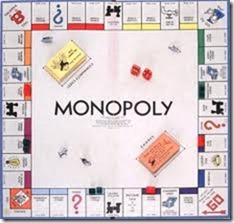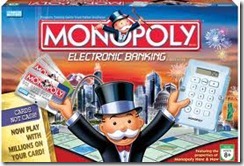I haven’t really ever played Monopoly while growing up, so me and husband bought one and brought it to our home on a Sunday with loads of fanfare. It took about six months to get the wrapper off the game and about three more months to actually playing it. (Well, in our defense, we are never really in home to do boardgame stuffs. But that’s not what the blog is about.)
The blog is about the game. So we did manage to play this game, just the two of us, yesterday night. With much excitement, we opened the boardgame, read the rules, prepped the dice and chose our fast-driving cars. For those who have never played the game, Monopoly is all about buying plots and then building houses and hotels on your property. Finally, in true Khosla Ka Ghosla style, by luck, crook or hook, you turn into a landlord and keep on collecting rent from people who through the roll of the unlucky dice land on your property. You keep on going round and round the board, buying property, building houses and collecting rent till all others than you are bankrupt. You can only win the game when the rest all are bankrupt and not by making money. So your aim? Make sure the rest of them become kangaal. Force them to sell properties, force them to pay you high rents, force their money off the table.
If you haven’t guessed or don’t already know, there’s one massive silent player in this on the side. It’s called the Bank. According to the rule book, the Bank holds the title deeds of all properties, the houses and hotel before they are purchased and all the rest of the money in the game. This player is neutral. After we as players have been given a puny amount to start the game (1500 currency each, while the Banker keeps the rest), the Bank is the place where all players do their transactions. They buy property or plots, the Bank gets rich. They have to pay rent to another player and don’t have the money, they mortgage the plot, the bank gets 10 percent for mortgaging. The player pays tax, it goes to the bank. The player is in Jail, the bail is to the Bank. In all transactions as the players get greedy (and it is a game of greed), fight over rent, purchase, convince each other and haggle like crazy, this silent partner gets rich and rich and rich. The Bank you see, is always there, even if you opt out by declaring bankruptcy. The Banker is so important that his face pops up on all Monopoly boardgames as a male, top hat and suit wearing fella.
Not very different really from our social set up right now where the Banker plays a vital role in all our lives. The Bank keeps your salary, gives you puny interest but also taxes you on bills, spends, credit cards, debit cards and many other complex rules. Most of the couples I know around me, have bought houses and are duly paying mortgages to the Bank. They have car loans, personal loans, cellphone EMIs and have one chore related to the bank on their weekend list. Mostly, one of their salaries is completely going to the Bank. And as all of us who have had drawing room conversations on this already know. The Banker always wins. Not only in the boardgame, but in life. Always.
In the view of recent bankruptcy threats by a bank in the USA (remember the Lehman Brothers who are already onto a new big deal in real estate), which brought the whole world on its knees and gave money to crooks, I who is full of questions had a very important on to ask from Monopoly’s rule book. What happens to the game when the Bank declares bankruptcy? And here’s the answer in Monopoly’s official rule book page:
What if the Bank runs out of money?
A. Some players think the Bank is bankrupt if it runs out of money. The Bank never goes bankrupt. To continue playing, use slips of paper to keep track of each player’s banking transactions, until the bank has enough paper money to operate again. The Banker may also issue “new” money on slips of ordinary paper.
So you see, the Bank knows its deals. Even if it runs out of paper money, it will just print more money or do the deal on a sheet of white paper which is better than bankruptcy as a letter in Financial Times informs us. Yemen just did that. I think Parker Brothers who created the game in 1903 had it right all the way to their bank. In an economy which works on currency and a society which works on aspiration and greed, the banker always wins. And isn’t that human nature?
On another note, before we called it a night, my luck with money made me win over my poor husband who was bankrupted by paying rent over and over again. But I still feel I had less money than the Banker! So no, it wasn’t a win really, if winning (and not others losing) was the aim of it all.




Thanks for remembering this game!
anytime Chethan 🙂 I enjoyed playing it. Must be the commerce queen in me 😉